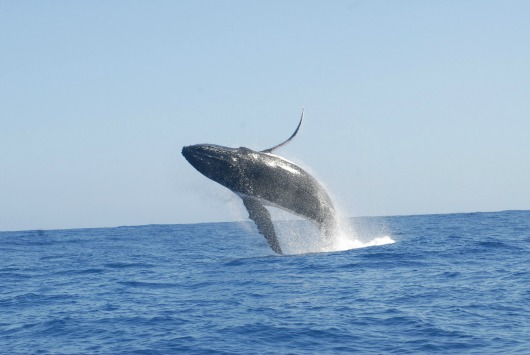Song cultures of whales give rare insight into evolutionary learning

Researchers from the University of St Andrews have made new discoveries about how the extraordinary cultural phenomenon of humpback whale songs are learned and shared.
It was already known that songs are transmitted eastwards across the South Pacific Ocean, travelling across breeding populations from Australia to French Polynesia in a series of ‘revolutions’ spanning just three years, passing in waves across the ocean. Now, Dr Ellen Garland and Dr Luke Rendell, from the School of Biology, along with colleagues in French Polynesia and Australia have revealed new insights about exactly how the change from old to new songs occurs, providing novel details of how evolution works within such animal cultures.
The team investigated rare cases of song hybridisation, found among thousands of hours of song from the South Pacific, where parts of an existing song were spliced with a new one, likely prior to an individual whale totally adopting the new song. The team unearthed two different kinds of structural rules guiding song change. In one, a whale sings some of the old and some of the new song, making a transition between them with a kind of short hybrid ‘phrase’. In the other approach they may splice into their current song a whole ‘theme’ from the new song others are beginning to sing.
Dr Ellen Garland from the University of St Andrews said: “These rare glimpses into the underlying learning mechanisms show that songs appear to be learnt as segments, reminiscent of the way children acquire language.”
The study findings appear in a special edition of the Proceedings of the National Academy of Sciences of the USA, The Extension of Biology through Culture, published this week, which features a new collection of articles by University of St Andrews scientists researching animal culture and behaviours.
Research concludes that discoveries about the widespread occurrence of all kinds of cultural traditions in animals mean that our broader understanding of how evolution works needs to be extended in substantial and fascinating ways.
Cultures passed on by learning from others have now been reported in hundreds of studies of animals as diverse as apes, whales, birds and bees. Past research has focussed on cultural learning and how it affects numerous aspects of their lives from how to find food, to avoiding predators, communicating with others, choosing a mate, setting up home or migrating. All this amounts to a second form of inheritance, based on learning from others, that allows behaviour to evolve in ways beyond those that have been prominent in mainstream evolutionary thinking, based on genetic inheritance.
Background information
The full article appears in PNAS, Proceedings of the National Academy of Sciences of the USA, The Extension of Biology through Culture.
Proceedings of the National Academy of Sciences (PNAS)
PNAS is one of the world’s most-cited and comprehensive multidisciplinary scientific journals, publishing more than 3100 research papers annually. Established in 1914, PNAS publishes cutting-edge research, science news, commentaries, reviews, perspectives, colloquium papers, and actions of the National Academy of Sciences.
The Special Edition of PNAS can be viewed online.
Issued by the University of St Andrews Communications Office. Contact Christine Tudhope on 01334 467 320 or [email protected]
Category Research